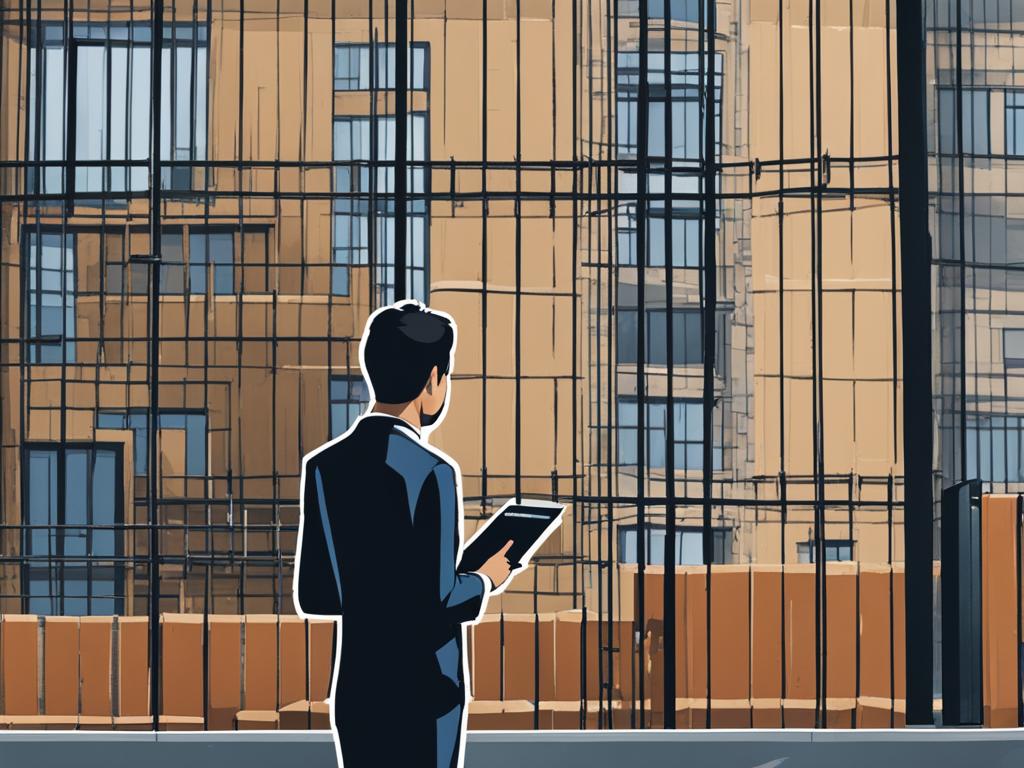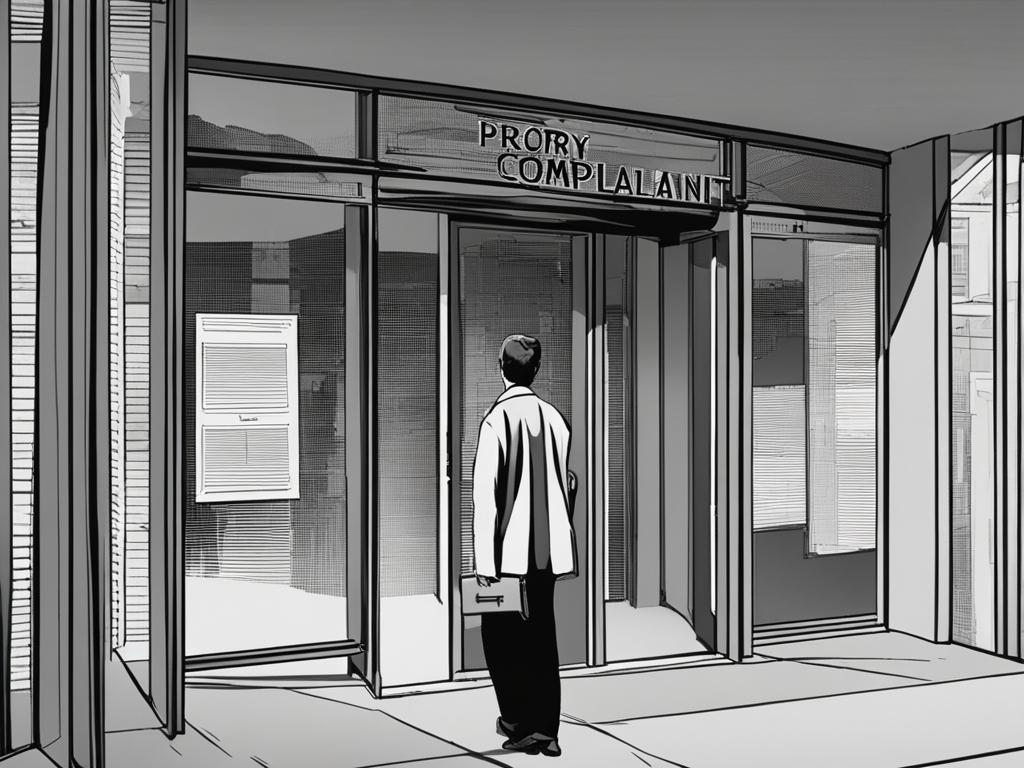Handling Neglect: What to Do When Your Property Manager Ignores You
As a property owner or a tenant, having a reliable, responsive property manager is crucial for the smooth management of a property. However, if your property manager starts ignoring your calls and emails or fails to address your concerns, it can create significant problems. In this article, we will provide effective strategies and steps to handle the neglect from your property manager and ensure that your rights as an owner or tenant are protected.
Key Takeaways:
- When your property manager ignores you, take immediate action to protect your rights as an owner or tenant.
- Document all instances of neglect in writing and maintain clear communication channels.
- If the neglect persists, consider evaluating the property manager’s credentials and communication provisions.
- For property owners, filing a negligence case against the property manager may be necessary to seek compensation for losses.
- Tenants should send a formal notice to the property manager and escalate the issue if necessary, seeking assistance from a tenants’ association or legal advice.
The Importance of Effective Property Management
Good property management is crucial for both property owners and tenants. A competent and responsive property manager can handle administrative tasks, ensure proper tenant screening, conduct property inspections, and maintain good relationships between owners and tenants. However, when a property manager fails to communicate effectively or becomes unresponsive, it can lead to various issues, including delays in maintenance, tenant dissatisfaction, and strained relationships.
Property management issues can arise for several reasons. Some property managers may lack the necessary organizational skills or fail to prioritize communication with owners and tenants. Others may become overwhelmed with their workload, leading to neglect of important tasks. In some cases, property managers may have poor interpersonal skills, making it difficult for them to handle conflicts or address concerns effectively.
Dealing with unresponsive or uncooperative property managers requires proactive steps from property owners and tenants. Clear and open communication is essential in addressing any issues that arise. Property owners should set expectations from the beginning, ensuring that their property manager understands the level of communication they expect. Tenants should not hesitate to express their concerns and seek resolution when faced with an unresponsive property manager.
In addition to communication, property owners and tenants can also consider seeking legal advice or exploring other options if necessary. This can help protect their rights and ensure that their property is managed effectively. By understanding the importance of effective property management and taking proactive measures to address issues, property owners and tenants can minimize problems and ensure a positive rental experience.
Recognizing the Signs of a Bad Property Management Company
When it comes to property management, not all companies are created equal. Unfortunately, there are some that fall short in their responsibilities and fail to meet the needs of both landlords and tenants. It’s crucial to be able to recognize the warning signs of a bad property management company, so you can take appropriate action before things spiral out of control.
One clear sign of a bad property management company is when landlords consistently ignore their tenants. Lack of communication and responsiveness can lead to frustration and dissatisfaction among tenants, ultimately affecting the landlord’s reputation and rental property success. Additionally, ineffective property managers may display delayed response times, often leaving tenants waiting for crucial repairs or assistance.
Another indicator of a bad property management company is poor tenant screening. When property managers fail to thoroughly screen prospective tenants, it can result in bad renters who may cause significant property damage, disturb other tenants, or fail to pay rent on time. These issues can lead to high turnover rates, financial losses, and legal complications for landlords.
“A bad property management company can create a negative cycle of neglect and frustration, impacting both landlords and tenants. Recognizing the warning signs and taking action early on is essential to protect your investment and maintain a positive rental experience.”
Furthermore, ineffective performance metrics can be telling of a bad property management company. High eviction rates, frequent late payment fees, and neglect of property maintenance are all indications that the company is not properly managing the properties under their care. These issues can result in costly legal battles, decreased property value, and tenant dissatisfaction.
Table: Warning Signs of a Bad Property Management Company
| Signs | Description |
|---|---|
| Consistent landlord ignorance of tenant concerns | Lack of communication and unresponsiveness from landlords towards tenant inquiries and issues. |
| Delayed response times | Property managers taking an extended period to address tenant requests or perform necessary repairs. |
| Poor tenant screening | Failing to thoroughly vet prospective tenants, leading to disruptive or problematic individuals renting the property. |
| Ineffective performance metrics | High eviction rates, frequent late payment fees, and neglect of property maintenance. |
Recognizing these warning signs of a bad property management company is crucial for landlords and tenants alike. By being aware of the red flags, both parties can take appropriate action to rectify the situation and seek better property management services.
What Property Owners Can Do When Their Manager Ignores Them
When property owners face neglect or unresponsiveness from their property manager, it is essential to take appropriate steps to address the situation. Here are some recommended actions:
- Evaluate Property Manager Credentials: Start by evaluating the credentials and track record of your property manager. Review their communication provisions, response times, and overall performance to ensure they meet your expectations.
- Document Your Concerns: It is crucial to document your concerns in writing, clearly outlining the issues you have faced and the attempts you have made to communicate with your property manager. This documentation will serve as evidence if legal action becomes necessary.
- Maintain Clear Communication Channels: Maintain clear and consistent communication channels with your property manager. Clearly state your expectations and the level of communication you require. This will help ensure that your concerns are addressed promptly.
- Consider Legal Action: If the neglect or unresponsiveness continues and results in significant damages or loss, you may need to consider filing a case against the property manager. Consult with a legal professional to understand the legal options available to you and seek compensation for any losses incurred.
Remember, as a property owner, it is your right to have a responsive and responsible property manager. Taking these steps can help protect your interests and ensure that your property is managed effectively.

“When the property manager neglects their responsibilities, property owners should not hesitate to take action to protect their investment and rights.”
Steps for Tenants When their Property Manager Ignores Them
When tenants find themselves facing neglect from their property manager, it is crucial to take specific steps to address the situation and protect their rights. By following these steps, tenants can work towards resolving the issue and ensuring that their concerns are heard.
Sending a Notice to the Property Manager
One of the first steps tenants can take is to send a formal notice to the property manager describing the issue at hand. This notice should be in writing and clearly outline the problem, along with any previous attempts made to communicate with the property manager. By documenting this communication, tenants can establish a paper trail that may be useful in future discussions or legal actions.
Documenting Communication with the Property Manager
In addition to sending a formal notice, tenants should also keep track of all communication efforts made with the property manager. This includes keeping a record of phone calls, emails, and any other form of correspondence. By documenting these interactions, tenants can demonstrate their attempts to address the issue and provide evidence if needed in the future.
In severe cases where the property manager continues to ignore tenant requests, it may be necessary for tenants to escalate the issue. This can be done by contacting the property management company directly or seeking assistance from a tenants’ association. In some situations, tenants may even need to seek legal advice or file a formal complaint against the property manager to protect their rights.
Summary:
When tenants face neglect from their property manager, they should take specific steps to address the situation. This includes sending a formal notice to the property manager and documenting all communication efforts. If the neglect continues, tenants may need to escalate the issue and seek legal advice or file a complaint against the property manager.
Understanding Your Legal Rights as an Owner or Tenant
When dealing with an unresponsive property manager, it’s important to understand your legal rights as a property owner or tenant. This knowledge can help you navigate the situation effectively and protect your interests. Here are some key points to consider:
Legal Rights for Property Owners:
- Tenant Screening: As a property owner, you have the right to expect your property manager to thoroughly screen prospective tenants to ensure their suitability.
- Maintenance and Repairs: Your property manager is obligated to address maintenance and repair issues promptly and effectively, ensuring the property is safe and habitable.
- Accounting and Financial Responsibilities: You have the right to receive accurate accounting records and timely financial statements from your property manager.
- Property Inspection: Regular property inspections should be conducted by your property manager to ensure compliance with applicable regulations and to identify any potential issues.
- Contractual Agreement: Your property manager should adhere to the terms and conditions outlined in your contractual agreement, including the provision of agreed-upon services.
Legal Rights for Tenants:
- Safe and Habitable Living Conditions: Your property manager is responsible for providing a safe and habitable living environment, ensuring that necessary repairs are made promptly.
- Privacy: Your property manager should respect your privacy rights and not enter your rental unit without proper notice, except in emergencies.
- Security Deposits: You have the right to receive a detailed inspection report and the return of your security deposit within a reasonable timeframe, minus any legitimate deductions.
- Non-Discrimination: Your property manager cannot discriminate against you based on protected characteristics such as race, color, religion, sex, or national origin.
- Disclosure of Information: Your property manager should provide necessary disclosures about the property, such as lead paint or potential hazards.
It’s important to note that these legal rights may vary depending on state and local laws. Consulting with a legal professional specializing in real estate or landlord-tenant matters can provide you with personalized advice based on your specific situation.

The Role of a Good Property Manager in Supporting Landlords
A good property manager plays a crucial role in supporting landlords by handling a wide range of responsibilities. They act as a bridge between property owners and tenants, ensuring that both parties have a smooth and efficient rental experience. Let’s explore the essential responsibilities and qualities of a good property manager.
Responsibilities of Property Managers
A reliable property manager is responsible for various tasks related to property management. These include:
- Advertising and marketing rental properties to attract potential tenants.
- Screening prospective tenants to ensure they meet the necessary criteria.
- Collecting rent and ensuring timely payment from tenants.
- Maintaining the property in good condition and overseeing necessary repairs and maintenance.
- Conducting regular inspections to ensure tenant compliance with lease terms and property rules.
- Addressing tenant concerns, resolving disputes, and mediating conflicts.
- Keeping accurate records of financial transactions, contracts, and leases.
- Staying up-to-date with local landlord-tenant laws and regulations.
Qualities of a Good Property Manager
A good property manager possesses specific qualities that make them effective in their role. These qualities include:
- Strong Communication Skills: Effective communication is vital for property managers to interact with property owners, tenants, and service providers.
- Organizational Skills: Property managers must juggle multiple tasks and responsibilities, requiring excellent organizational and time management skills.
- Attention to Detail: Managing rental properties involves dealing with various documents, contracts, and financial records. A good property manager pays close attention to detail to ensure accuracy and compliance.
- Problem-Solving Abilities: Property managers need to find solutions to various issues that may arise, such as tenant complaints, maintenance emergencies, or legal matters.
- Customer Service Orientation: Providing exceptional customer service to both property owners and tenants fosters positive relationships and promotes tenant satisfaction.
- Ethical Standards: A good property manager adheres to ethical standards, treating all parties fairly and transparently.
A competent and dedicated property manager with these qualities can significantly support landlords in effectively managing their rental properties and ensuring a positive rental experience for both owners and tenants.

Filing a Complaint Against a Property Management Company
If all attempts to resolve the issues with the property management company fail, you have the option to file a complaint. There are various steps you can take to initiate the complaint process and seek a resolution. One method is to reach out directly to the property management company’s owner or higher-level management. Explain the situation in detail, including the neglect experienced and the attempts made to address the issue.
Another option is to utilize industry resources such as real estate associations or organizations like the Better Business Bureau (BBB). These entities provide platforms for filing complaints against property management companies and can help mediate between parties to find a resolution. It is important to clearly document the issues you have faced, provide any supporting evidence, and follow the complaint procedures outlined by the respective organization.
If informal methods do not lead to a satisfactory outcome, you may need to consider legal recourse. Consult with a lawyer specializing in real estate or tenant-landlord law to understand your rights and explore legal options. They can guide you through the process of filing a lawsuit against the property management company. Mediation may also be an option, where a neutral third party assists in facilitating a resolution between you and the company.
Remember that each option for filing a complaint against a property management company has its own process and requirements. Research the available avenues and choose the one that best suits your situation. By taking proactive measures and seeking resolution, you are taking a stand to protect your rights as an owner or tenant.

Table: Steps for Filing a Complaint Against a Property Management Company
| Step | Description |
|---|---|
| 1 | Attempt to resolve the issue directly with the property management company. |
| 2 | Reach out to the company’s owner or higher-level management to escalate the complaint. |
| 3 | Utilize industry resources such as real estate associations or the Better Business Bureau (BBB) to file a formal complaint. |
| 4 | If necessary, consult with a lawyer specializing in real estate or tenant-landlord law to explore legal options. |
| 5 | Consider mediation as an alternative means of resolving the dispute. |
Conclusion
Dealing with an unresponsive property manager can be frustrating, but it’s crucial to take action and protect your rights as a property owner or tenant. When faced with neglect from your property manager, it’s important to know what steps to take to address the situation. By following the strategies outlined in this article, you can empower yourself and ensure that your concerns are heard and resolved.
Handling the neglect from a property manager requires a proactive approach. By documenting all communication efforts and sending formal notices to the property manager, you establish a paper trail that can be useful if further action is needed. If the neglect persists, don’t hesitate to escalate the issue by contacting the property management company or seeking assistance from a tenants’ association.
It’s also important to familiarize yourself with your legal rights as a property owner or tenant. Depending on the severity of the neglect, you may be able to take legal actions against the property manager, such as filing complaints or seeking compensation for damages. Remember, a good property manager is essential for a successful and satisfying property management experience, and taking proactive measures is key in handling neglect effectively.
FAQ
What should I do if my property manager is ignoring me?
If your property manager is ignoring you, start by evaluating their credentials and communication provisions. Document your concerns in writing and maintain clear communication channels. If the neglect persists and causes significant damages, you may need to file a negligence case against the property manager to seek compensation for the losses.
How can I address neglect from my property manager as a tenant?
As a tenant, start by sending a formal notice describing the issue and document all communication efforts. If the property manager continues to ignore the requests, escalate the issue by contacting the property management company or seeking assistance from a tenants’ association. In severe cases, tenants may need to seek legal advice or file a formal complaint against the property manager.
What are my legal rights as a property owner or tenant when dealing with an unresponsive property manager?
Both property owners and tenants have rights and obligations to ensure the safety and wellbeing of the property. Depending on the severity of the neglect, legal actions can be taken against the property manager, including filing a complaint, seeking compensation for damages, or involving local law enforcement officials.
What are the responsibilities of a good property manager?
A good property manager handles various responsibilities such as rent collection, tenant screening, property inspections, maintenance, and compliance with local laws and regulations. Effective communication, professionalism, and knowledge of property management legislation are essential qualities of a reliable property manager.
How can I file a complaint against a property management company?
If all attempts to resolve the issues with the property management company fail, you have the option to file a complaint. This can be done by contacting the owner or higher-level management of the company, utilizing industry resources such as real estate associations or the Better Business Bureau, or seeking legal recourse through lawsuits or mediation. Each option has its own process and requirements, so it’s important to research and follow the appropriate steps.

